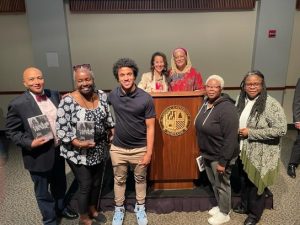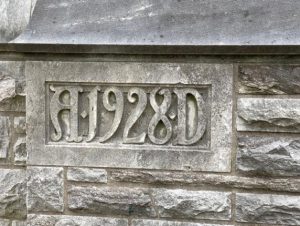This article is the fourth of a four-part series investigating Loyola’s connections to slavery.
Over the course of two years, publishers, authors, and editors have been cultivating “Untold Truths: Exposing Slavery and Its Legacies at Loyola University Maryland.” The book was launched at an event on April 15 and included several testimonies, including from President Terrence Sawyer, J.D., Vice-President for Mission and Identity, Milton Bravo, student researchers who read excerpts from their pieces, and members of the descendant community.
“[The] Untold Truths book launch was a celebration of student and descendant research, scholarship, and creative writing. The transparency, integrity, and composure with which undergraduate students read excerpts… highlighted how students have been crucial contributors to this pivotal moment for Loyola,” Dr. Carey said.

Nicholas West ‘24, attended the event to learn more about the research. West was introduced to chapters of the books at the event that introduced minstrel shows at Loyola, the first Black student at Loyola Charles H. Dorsey, and overall, the benefit of $115,000 raised by Georgetown University from the Georgetown enslavement sale of 1838 in founding Loyola. West was appalled by what the research uncovered.
“As a child, you never thought that you would ever come close to anything as horrible. Yet here I am, at a school funded by the slave trade.”
In reflecting on the university’s next reconciliation steps, West expressed hopes for more inclusive and responsive actions.
“I hope people take what they learned from this book and try to make Loyola better in the future; not only for Black students, but for all marginalized groups that have faced backlash on or within Loyola’s campus.”
A few related recommendations mentioned in the final report that correlate to West’s acknowledgments include “Infuse[ing] the history of Loyola’s connections to slavery and its legacies into campus life and culture,’ ‘Expand[ing] Loyola’s support for existing DEIJ-focused initiatives on campus,’ and ‘Develop[ing] an Advancement strategy to endow these activities.”
Israel White ‘24, a student researcher, an author of the book, and co-emcee of the launch said that as a leader of sharing this project he “want[s] people to take away from the book an understanding of what engaging with history can do and can look like.”
White has recognized the impact of what it means to engage in this material.
“There’s this distance that’s often placed between the past and the present… as if they are in two completely separate houses, even though they live in the same room,” White said. “Through engaging with history, we’re acknowledging our living relationship.”
At Loyola, the next steps in implementing change will be critical. Whether the changes are made will tell of Loyola’s commitment to reckon and officially acknowledge the benefits of the GU272 sale. These major recommendations within the book and the final report include:
Changing Loyola’s school colors to not include grey, as it is a representation of the Confederacy.
Renaming buildings including the Andrew White Student Center and Jenkins Hall.
Making Loyola more accessible to members of the GU272 descendant community through Enrollment Management, Advancement, and community groups.

Untold Truths is available to read on several platforms including Barnes and Nobles and Amazon, and more information can be found here.
Alexis Faison is senior and a student representative of the President’s Task Force Examining Loyola’s Connections to Slavery, a researcher, and an editor of the book: Untold Truths: Exposing Slavery and Its Legacies at Loyola University Maryland. This is the fourth and final part of the series: Loyola’s Legacy: Unveiling Hidden Truths of Slavery.










































































































